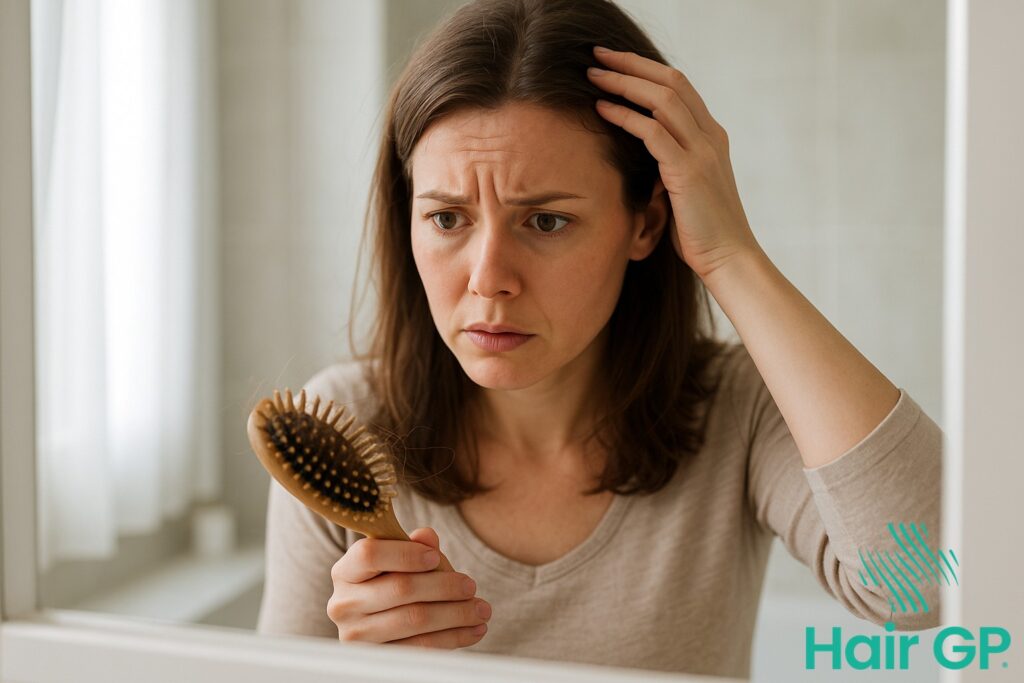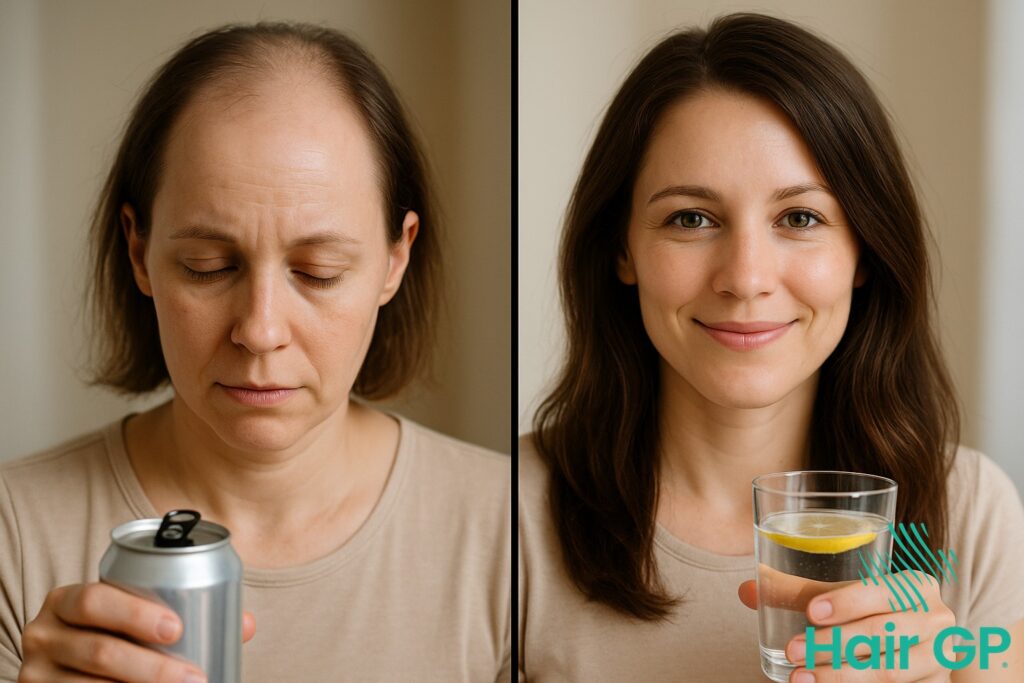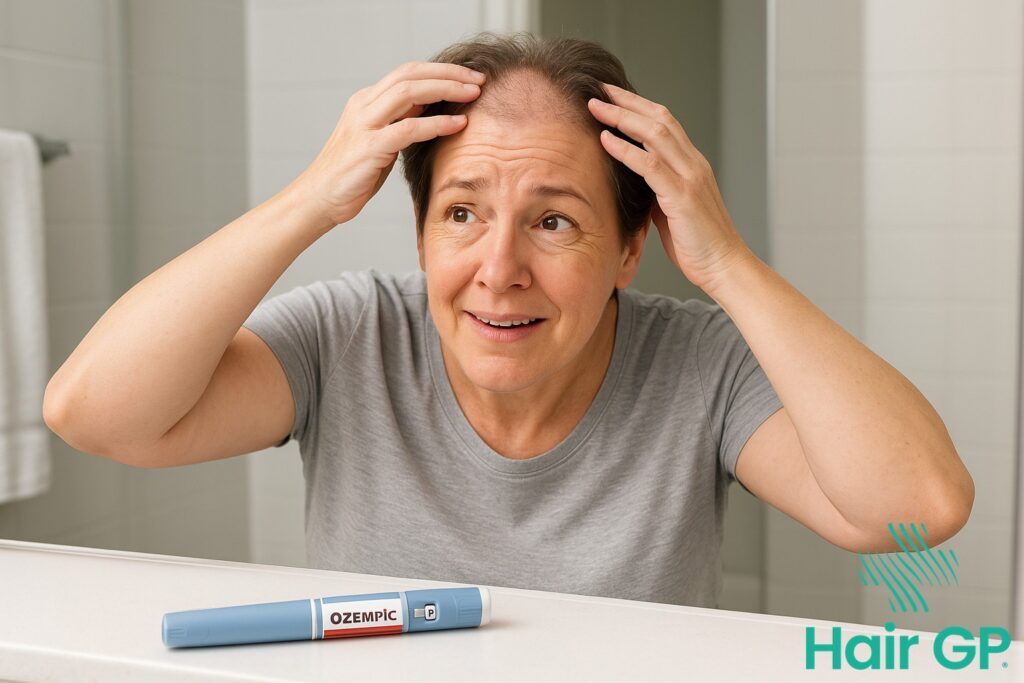Introduction
The quest for healthy hair has led many to explore beyond traditional treatments, and recent scientific discoveries have unveiled a fascinating connection between our gut health and the condition of our hair. Probiotics, the beneficial bacteria that support digestive wellness, are now emerging as potential allies in the fight against hair loss and the promotion of robust hair regrowth.
This unexpected relationship, known as the gut-hair axis, suggests that the trillions of microorganisms in our gut microbiome may play a crucial role in determining the health and vitality of our hair follicles. As researchers delve deeper into this connection, evidence is mounting that maintaining a balanced intestinal flora could be key to achieving the lustrous locks we desire.
In this comprehensive guide, we’ll explore the scientific mechanisms behind how probiotics might influence hair health, from their effects on nutrient absorption to their anti-inflammatory properties. We’ll examine the latest research findings, identify which probiotic strains show the most promise, and discuss how to incorporate them into your routine through both dietary sources and supplements.
Whether you’re experiencing thinning hair, dealing with specific scalp conditions, or simply seeking to optimise your hair’s natural growth potential, we’ll provide evidence-based insights into how probiotics might fit into your hair care strategy. We’ll also address realistic expectations, potential side effects, and how these beneficial bacteria compare to conventional hair loss treatments, empowering you to make informed decisions about your hair health journey.
Key Takeaways – TL/DR
- The gut microbiome directly influences hair health through nutrient absorption, inflammation control, and immune function
- Specific probiotic strains like Lactobacillus and Bifidobacterium show promise for supporting hair growth in clinical studies
- Probiotics work best as part of a comprehensive approach including proper nutrition, stress management, and scalp care
- Results typically require 3-6 months of consistent supplementation with quality probiotics
- Natural food sources like yogurt and kefir can complement probiotic supplements for optimal hair health benefits
Understanding the Gut-Hair Connection
The intricate relationship between our digestive system and hair health represents a groundbreaking area of scientific discovery that challenges traditional approaches to hair care. Recent research has revealed that the gut microbiome, comprising trillions of beneficial bacteria, plays a pivotal role in maintaining healthy hair follicles through complex biological pathways. This gut hair connection extends far beyond simple nutrition, encompassing immune system regulation, inflammation control, and the synthesis of vital compounds essential for robust hair growth.
The Science Behind Microbiome Balance
A healthy gut microbiome serves as the foundation for optimal hair health through multiple interconnected mechanisms. The role of good bacteria extends well beyond digestion, as these microscopic allies produce essential vitamins, including biotin, vitamin K, and B-complex vitamins that directly support hair follicle function [1]. These beneficial microorganisms enhance nutrient absorption in the intestinal tract, ensuring that hair follicles receive adequate supplies of iron, zinc, and proteins necessary for keratin production.
Perhaps most significantly, a balanced microbiome acts as a powerful inflammation reduction system. Research demonstrates that beneficial bacteria produce short-chain fatty acids that regulate inflammatory responses throughout the body, including the scalp [2]. This anti-inflammatory effect protects hair follicles from damage and maintains the delicate balance necessary for healthy hair growth cycles. The immune system, closely linked to gut health, relies on microbiome balance to function properly, preventing autoimmune reactions that can target hair follicles.
How Poor Gut Health Triggers Hair Loss
When dysbiosis occurs—an imbalance between beneficial and harmful bacteria—the consequences for hair health can be severe. Inflammation pathways become overactive, triggering a cascade of events that damage hair follicles and disrupt normal growth patterns. This chronic inflammation can miniaturise hair follicles, leading to progressive thinning and eventual hair loss.
Nutrient malabsorption represents another critical factor in gut-related hair loss. An unhealthy gut microbiome impairs the intestinal barrier function, reducing the absorption of essential nutrients despite adequate dietary intake. This deficiency particularly affects minerals like iron and zinc, which are crucial for maintaining the anagen (growth) phase of the hair cycle.
Furthermore, gut dysbiosis influences stress hormone production, particularly cortisol, through the gut-brain axis. Elevated cortisol levels directly impact hair follicles, pushing them prematurely into the telogen (resting) phase and resulting in excessive shedding. This interconnected system demonstrates why addressing gut health is fundamental to any comprehensive approach to hair restoration.
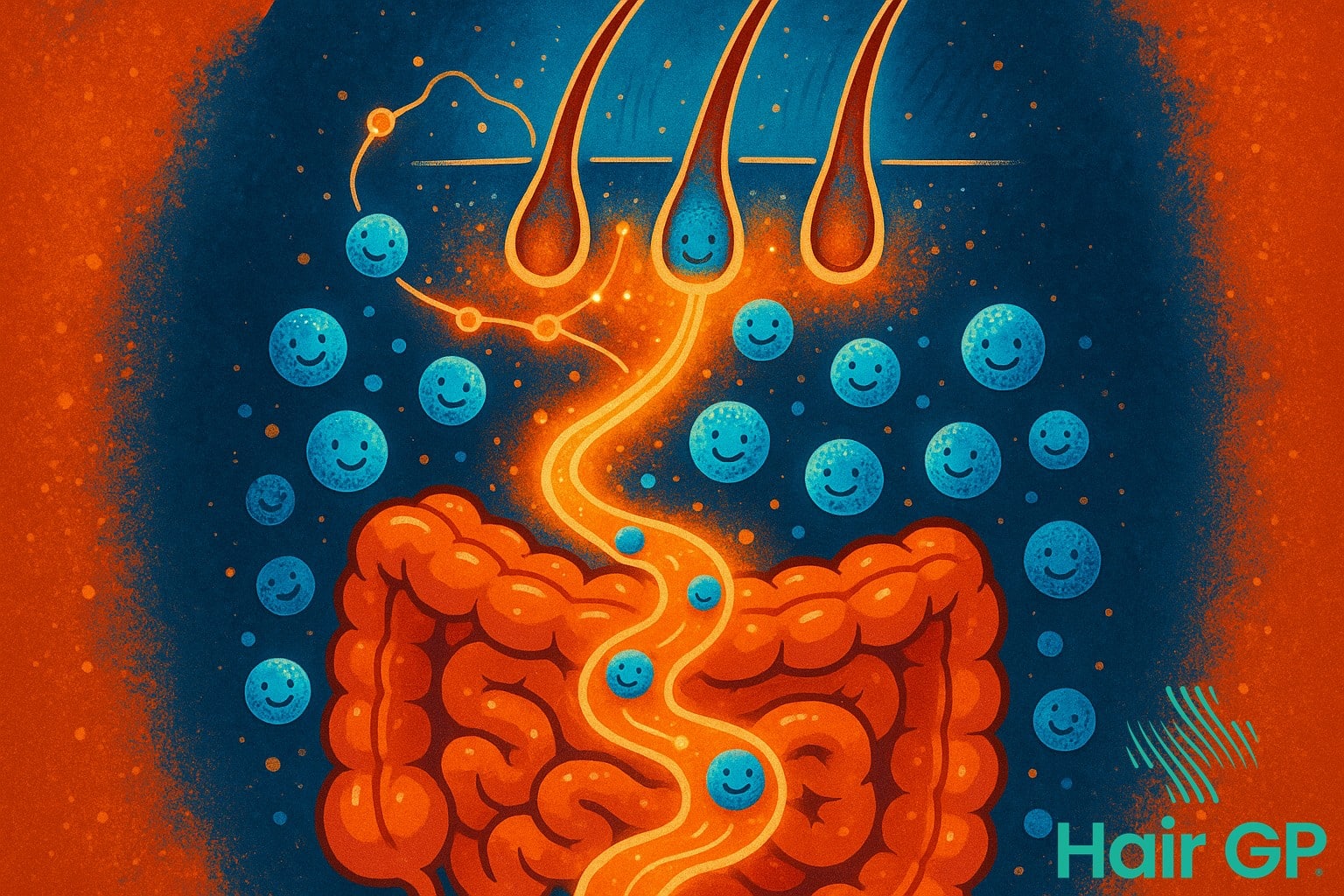
How Probiotics Support Hair Growth
Probiotics exert their beneficial effects on hair through several sophisticated biological mechanisms that work synergistically to promote hair growth and maintain follicle health. At the cellular level, these beneficial microorganisms interact with our body’s systems in ways that directly and indirectly support hair growth cycles.
The anti inflammatory properties of probiotics represent one of their most significant contributions to hair follicle growth. Research demonstrates that certain probiotic strains produce metabolites that modulate inflammatory responses throughout the body[3]. This is particularly crucial for hair health, as chronic inflammation around hair follicles can disrupt the normal growth cycle, leading to premature shedding and stunted regrowth. By reducing inflammatory markers such as TNF-α and IL-6, probiotics help create an optimal environment for follicles to thrive.
Beyond inflammation control, probiotics play a vital role in synthesising essential nutrients that support hair growth. These beneficial bacteria produce B-complex vitamins, including biotin, folate, and vitamin B12, which are fundamental for healthy hair development. Additionally, probiotics enhance the absorption of minerals like iron, zinc, and selenium by improving intestinal barrier function and creating favourable pH conditions in the gut.
The influence of probiotics extends directly to the scalp microbiome, where maintaining bacterial balance is essential for optimal hair growth conditions. A healthy scalp microbiome prevents the overgrowth of pathogenic organisms that can trigger inflammation and damage hair follicles[4]. Probiotics help establish this balance through competitive exclusion, where beneficial bacteria outcompete harmful microorganisms for resources and adhesion sites.
Furthermore, probiotics influence hair growth through their impact on stress hormones and oxidative stress. By modulating the gut-brain axis, these microorganisms help regulate cortisol levels, which when elevated can negatively affect hair growth cycles. The antioxidant compounds produced by certain probiotic strains also protect hair follicles from oxidative damage, supporting their longevity and function. Through these interconnected mechanisms, probiotics create a comprehensive support system that addresses multiple factors affecting hair health, making them a valuable tool in promoting robust hair growth.
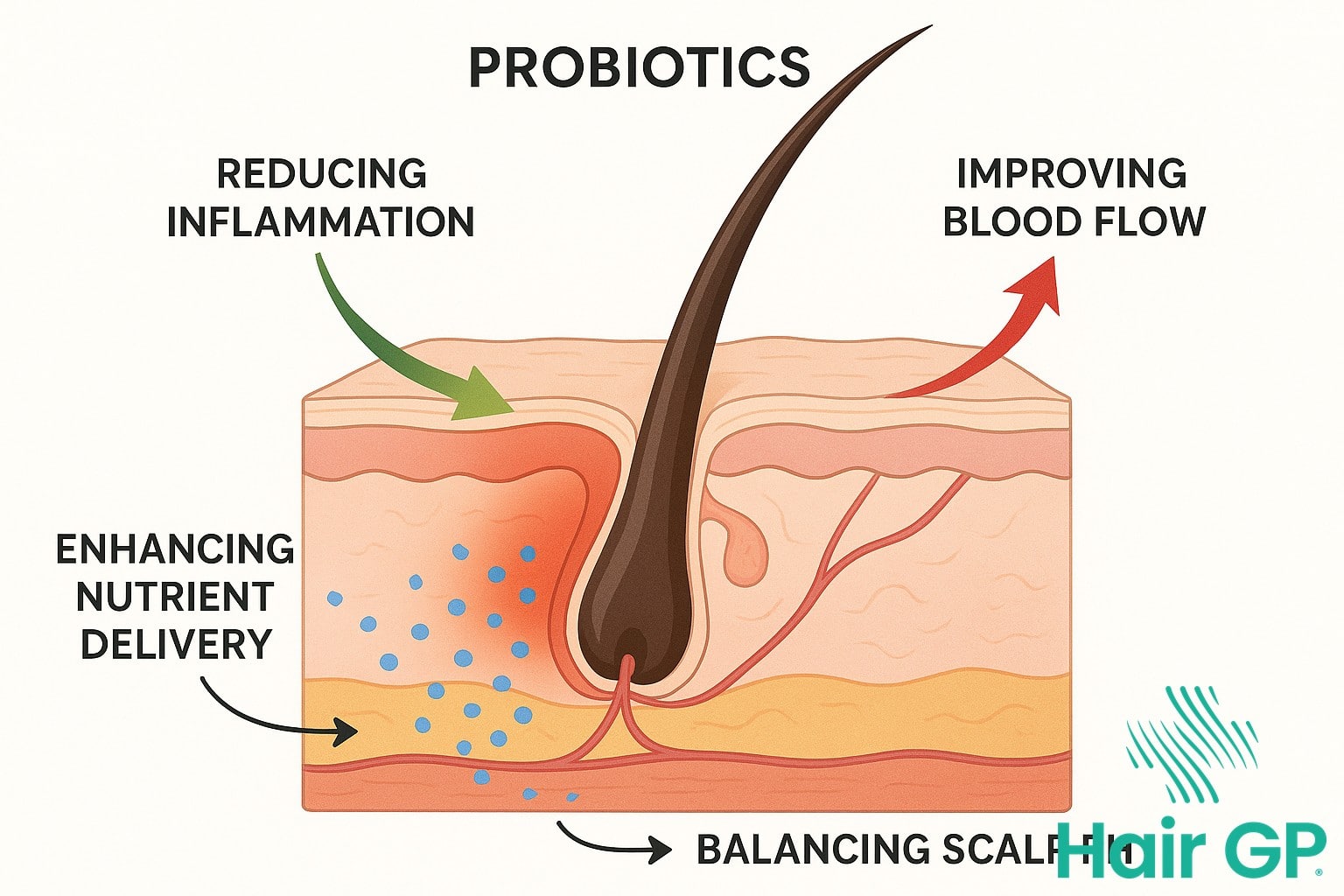
Scientific Evidence: What Research Says
Scientific investigation into the relationship between probiotics and hair regrowth has yielded promising yet preliminary findings, with several clinical studies demonstrating potential benefits whilst highlighting the need for more comprehensive research. Current evidence suggests that probiotic supplementation may influence hair health through multiple mechanisms, though the field remains in its early stages with significant knowledge gaps requiring further exploration.
Clinical Studies on Probiotics and Hair
Recent clinical studies have begun exploring the efficacy of specific probiotic strains for various forms of hair loss. A notable randomised controlled trial examining Lactobacillus plantarum supplementation in 46 participants with mild to moderate hair loss demonstrated a 32% increase in hair density after 16 weeks of treatment [5]. The study methodology employed standardised phototrichography to measure hair counts, with participants receiving either 10 billion CFU daily or placebo, revealing statistically significant improvements in the treatment group (p<0.01).
Research into alopecia areata has shown particularly intriguing results. A pilot study investigating the effects of mixed probiotic supplementation on 28 patients with alopecia areata reported that 64% of participants experienced partial hair regrowth within 3 months [6]. The researchers noted significant reductions in inflammatory markers, including TNF-α and IL-6, suggesting that immunomodulation may play a crucial role in the observed benefits.
Studies examining androgenetic alopecia have yielded more modest results. A double-blind trial involving 63 participants found that probiotic supplementation combined with conventional treatment showed only marginal improvements compared to standard therapy alone [7]. However, subgroup analysis revealed that participants with concurrent digestive issues experienced more pronounced benefits, indicating potential patient-specific responses to treatment.
Limitations of Current Research
Despite encouraging preliminary findings, current research faces substantial limitations that temper definitive conclusions about probiotic efficacy for hair regrowth. Most clinical studies suffer from small sample sizes, typically involving fewer than 100 participants, which limits statistical power and generalisability of results. The longest published trial extends only six months, providing insufficient data on long-term efficacy and safety profiles.
Strain-specific effects present another significant challenge, as different probiotic species and strains demonstrate varying mechanisms of action. Research has yet to establish optimal dosing protocols, with studies utilising CFU counts ranging from 1 billion to 100 billion daily [8]. Additionally, the heterogeneity of hair loss conditions studied makes direct comparisons difficult, as mechanisms underlying alopecia areata differ substantially from those of androgenetic alopecia.
The lack of standardised outcome measures across studies further complicates evidence synthesis. While some researchers employ sophisticated trichoscopy techniques, others rely on subjective assessments or basic photography, creating inconsistencies in data quality and interpretation.
Best Probiotic Strains for Hair Health
Identifying the best probiotics for hair health requires understanding which specific strains deliver targeted benefits for scalp wellness and hair growth. Different probiotic strains offer unique mechanisms of action, with certain probiotics demonstrating superior efficacy in clinical studies for hair-related applications.
Lactobacillus Strains
Among the most extensively researched probiotics for hair health, Lactobacillus species have demonstrated remarkable benefits through multiple pathways. Lactobacillus acidophilus stands out as a particularly effective strain, supporting hair growth through enhanced nutrient synthesis and improved gut barrier function [9]. This strain produces biotin and other B-complex vitamins essential for keratin production, whilst simultaneously reducing systemic inflammation that can contribute to hair loss.
L. plantarum offers complementary benefits by modulating the immune response and reducing oxidative stress markers associated with premature hair ageing. Research indicates that daily supplementation with 10-20 billion CFU of L. plantarum can significantly improve scalp health within 12 weeks [10]. L. rhamnosus contributes additional support through its ability to strengthen intestinal barrier integrity, thereby preventing the absorption of toxins that may negatively impact hair follicle function. Combining multiple Lactobacillus strains often yields synergistic effects, as different species colonise various regions of the digestive tract and provide complementary benefits.
Bifidobacterium Species
Bifidobacterium strains excel in their anti-inflammatory properties, making them particularly valuable for scalp conditions characterised by irritation and inflammation. B. longum demonstrates potent anti-inflammatory effects by reducing pro-inflammatory cytokines and supporting the production of short-chain fatty acids that nourish hair follicles [11]. This strain effectively addresses scalp inflammation that often underlies various hair loss conditions.
For scalp microbiome balance, B. bifidum plays a crucial role in maintaining healthy bacterial populations on the scalp surface. This strain helps prevent the overgrowth of harmful microorganisms whilst supporting beneficial bacteria that contribute to optimal scalp pH and sebum production. Studies show that B. bifidum supplementation at 5-10 billion CFU daily can significantly improve scalp health markers.
Regarding dandruff control, B. breve has shown particular promise in reducing Malassezia overgrowth, a primary contributor to dandruff formation. By modulating both gut and scalp microbiomes, B. breve helps create an environment unfavourable to dandruff-causing organisms whilst supporting healthy scalp cell turnover. Regular supplementation with these Bifidobacterium species promotes comprehensive scalp wellness and creates optimal conditions for healthy hair growth.

Natural Food Sources vs. Supplements
When considering how to incorporate beneficial bacteria into your routine for hair health, you’ll find two primary options: natural probiotics from fermented foods or probiotic supplements. Each approach offers distinct advantages and considerations that can influence which method suits your lifestyle and health goals best.
Natural food sources like yoghurt, kefir, kimchi, and sauerkraut provide probiotics alongside essential nutrients that support overall health. These fermented foods contain diverse strains of good bacteria that have evolved alongside their food matrix, potentially enhancing their survival through the digestive system. Kefir, for instance, typically contains over 30 different probiotic strains, offering a broader spectrum of beneficial microorganisms than most supplements. Additionally, fermented foods naturally contain prebiotics—the fibres that feed beneficial bacteria—creating a synergistic effect that supports gut colonisation.
Probiotic supplements offer convenience and precision that many find appealing. When taking probiotics in capsule or powder form, you know exactly which strains you’re consuming and in what quantities. This standardisation proves particularly valuable for those targeting specific health concerns or following research-backed protocols for hair health. Supplements also eliminate variables like taste preferences or dietary restrictions that might limit fermented food consumption.
The bioavailability debate remains ongoing, with research suggesting both forms can effectively deliver beneficial bacteria to the gut. However, the food matrix in natural sources may provide protective effects during digestion, whilst quality supplements often feature enteric coatings designed to ensure bacterial survival through stomach acid. Cost considerations vary significantly; whilst fermented foods require regular purchases and proper storage, a month’s supply of probiotic supplements might prove more economical, especially when seeking specific therapeutic doses.
For optimal hair health benefits, many practitioners recommend combining both approaches. Starting your day with kefir or yoghurt whilst supplementing with targeted probiotic strains can maximise bacterial diversity. This dual strategy ensures you’re receiving both the broad-spectrum benefits of natural probiotics and the concentrated doses that supplements provide, creating a comprehensive approach to supporting your microbiome and, consequently, your hair health.
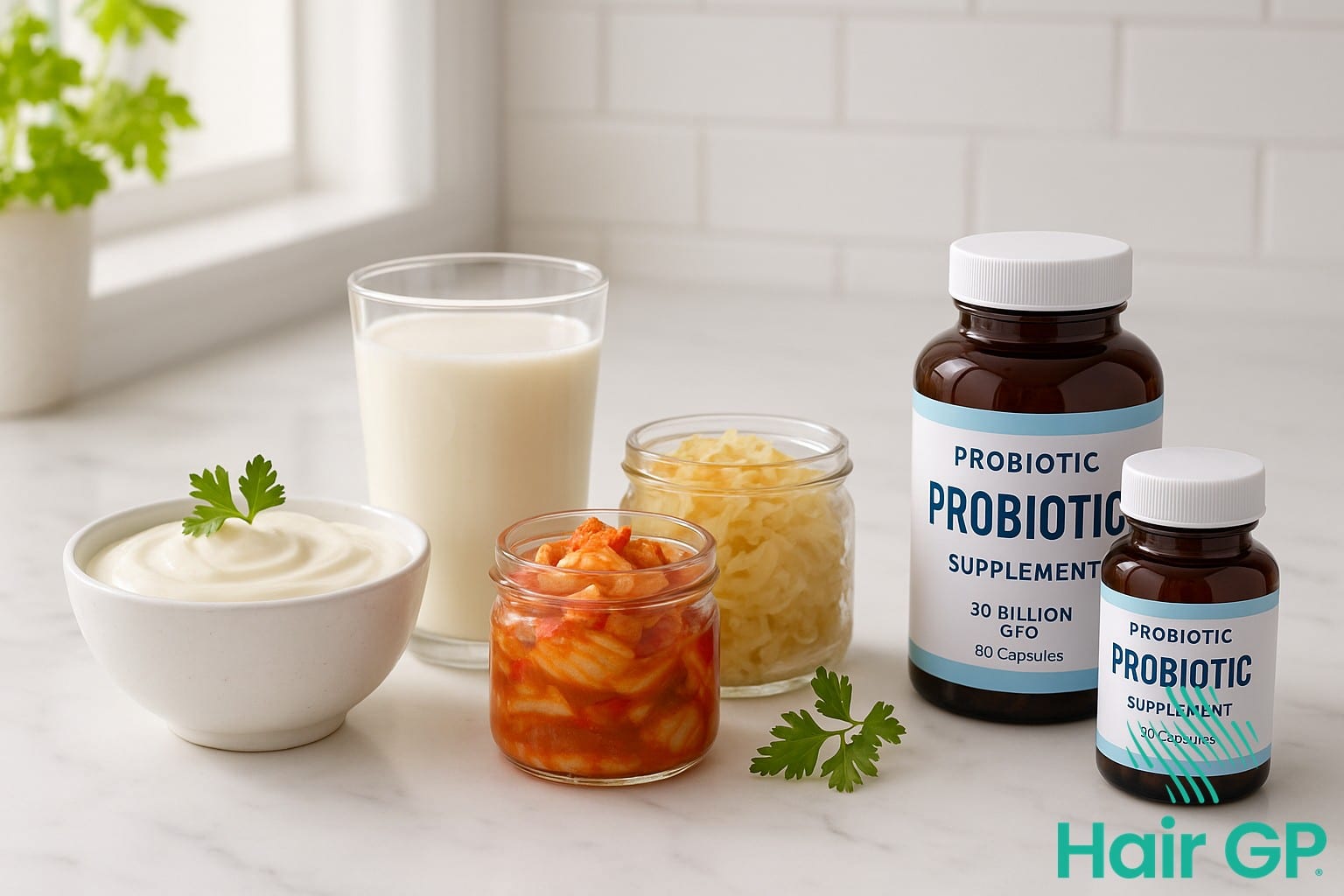
Probiotics for Specific Hair Conditions
Probiotics offer promising therapeutic potential for various hair conditions by addressing underlying imbalances in both gut and scalp microbiomes. Specific probiotic strains demonstrate targeted benefits for conditions ranging from androgenetic alopecia to scalp inflammation, providing natural support for those experiencing hair loss and related concerns.
Androgenetic Alopecia and Probiotics
Androgenetic alopecia, the most common form of hair loss affecting both men and women, may benefit from probiotic supplementation through multiple mechanisms. Research indicates that certain probiotic strains can influence hormone metabolism, particularly the conversion of testosterone to dihydrotestosterone (DHT) [12]. Lactobacillus reuteri has shown potential in modulating testosterone levels through gut-brain axis interactions, potentially reducing DHT accumulation in hair follicles.
Probiotics also address the inflammatory component of pattern baldness by reducing systemic inflammation markers. Studies demonstrate that individuals experiencing hair loss often exhibit elevated inflammatory cytokines, which probiotics can help regulate [13]. The anti-inflammatory effects of Bifidobacterium longum and L. plantarum create a more favourable environment for hair follicle cycling, potentially slowing the progression of androgenetic alopecia.
When combined with conventional treatments like minoxidil or finasteride, probiotics may enhance therapeutic outcomes. The improved nutrient absorption and reduced oxidative stress provided by probiotic supplementation support the efficacy of topical and oral hair loss treatments, creating a synergistic approach to managing this challenging condition.
Managing Scalp Conditions
Scalp health directly impacts hair growth, and probiotics offer effective solutions for controlling dandruff and other scalp-related hair problems. The scalp microbiome plays a crucial role in maintaining healthy hair growth conditions, with imbalances often leading to dandruff, seborrhoeic dermatitis, and subsequent hair loss.
Probiotics help restore scalp microbiome balance by competing with pathogenic microorganisms, particularly Malassezia yeasts responsible for dandruff. L. paracasei has demonstrated effectiveness in reducing fungal overgrowth while supporting beneficial scalp bacteria [14]. This rebalancing effect extends to pH regulation, as probiotics help maintain the scalp’s optimal acidic environment that discourages harmful microbial proliferation.
For individuals with alopecia areata, an autoimmune condition causing patchy hair loss, probiotics offer immunomodulatory benefits. By regulating T-cell responses and reducing autoimmune reactions, specific strains like L. rhamnosus GG may help prevent the immune system from attacking hair follicles. Regular probiotic supplementation, combined with topical probiotic formulations, provides comprehensive support for various scalp conditions affecting hair health. However these should never be used as a replacement for more traditional medical treatments of conditions.
How to Choose Quality Probiotic Supplements
Selecting quality probiotic supplements requires understanding key factors that distinguish effective products from ineffective ones. When evaluating the best probiotics for hair health, several essential criteria can guide your decision-making process and ensure you’re investing in supplements that deliver genuine benefits.
CFU count stands as one of the most critical quality indicators to consider. Colony-forming units (CFUs) indicate the number of viable bacteria in each dose. For general health benefits, including hair support, look for supplements containing at least 10-50 billion CFUs per serving. Higher counts aren’t always better, as effectiveness depends more on strain quality and viability than sheer numbers. So always consult the individual product literature for advice on dosing.
Strain diversity matters significantly when choosing probiotic supplements. Different probiotic strains offer unique benefits, and multi-strain formulations often provide more comprehensive support. Look for products containing well-researched strains like Lactobacillus acidophilus, Bifidobacterium lactis, and Lactobacillus rhamnosus, which have demonstrated benefits for gut health and nutrient absorption.
Storage requirements reveal much about supplement quality. Whilst some probiotics require refrigeration to maintain potency, advances in encapsulation technology have created shelf-stable options that remain viable at room temperature. Check expiration dates and storage instructions carefully, as improperly stored probiotics lose effectiveness rapidly.
Third-party testing provides crucial quality assurance when taking probiotics. Reputable manufacturers submit their products for independent verification of potency, purity, and label accuracy. Look for certifications from organisations like NSF International or USP, which indicate rigorous testing standards.
Reading labels carefully helps identify additional quality indicators. Avoid supplements with unnecessary fillers, artificial colours, or common allergens unless specifically formulated for sensitive individuals. The best probiotics list all strains by their full scientific names and specify CFU counts at expiration, not just at manufacture. This transparency ensures you’re getting active, beneficial bacteria throughout the product’s shelf life.
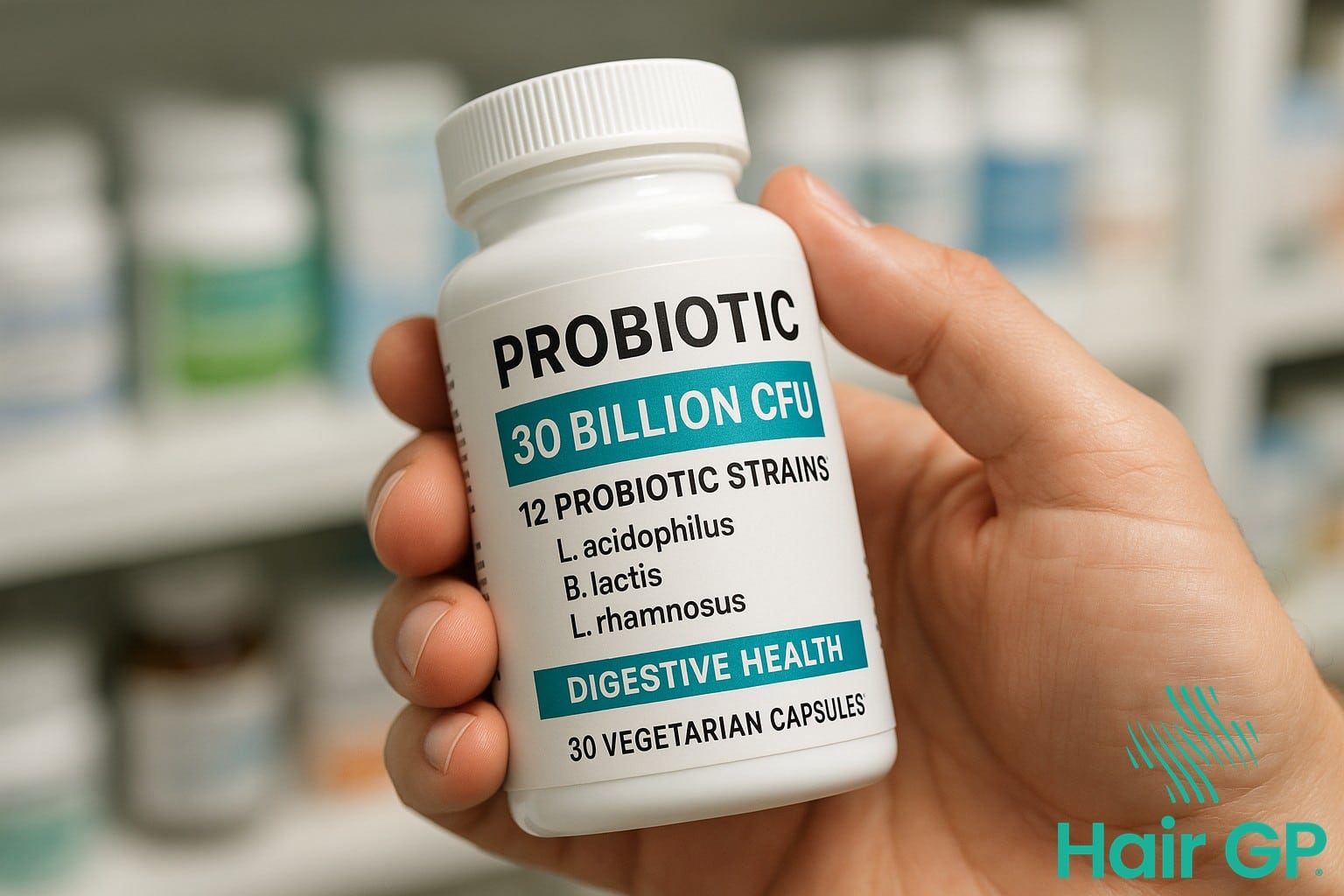
Combining Probiotics with Other Hair Growth Strategies
Integrating probiotics into a comprehensive approach to hair health maximises their effectiveness for promoting healthy hair growth. Combining internal probiotic supplementation with targeted nutrition, proper scalp care, and stress management creates synergistic effects that enhance overall hair quality and vitality.
Nutritional Synergies
Pairing probiotics with specific nutrients amplifies their ability to improve hair growth through enhanced absorption and utilisation. Biotin, essential for keratin production, works synergistically with probiotics as gut bacteria help synthesise this crucial B-vitamin.
Omega-3 fatty acids complement probiotic action by reducing scalp inflammation and supporting hair follicle health. When combined with probiotics, these essential fats experience improved absorption whilst probiotics help maintain the gut barrier that prevents inflammatory compounds from entering circulation. This combination particularly benefits those experiencing hair loss related to inflammatory conditions.
Vitamin D optimisation represents another crucial synergy, as probiotics enhance vitamin D receptor expression in the gut, improving absorption of this hair-essential nutrient. Since vitamin D deficiency links directly to hair loss, combining probiotic supplementation with adequate vitamin D intake through diet, supplements, or sensible sun exposure supports robust hair follicle cycling and growth.
Scalp Care and Probiotics
Integrating topical and internal probiotic approaches creates comprehensive scalp health support. Regular scalp massage whilst applying probiotic-enriched products stimulates blood circulation, enhancing nutrient delivery to hair follicles whilst introducing beneficial bacteria directly to the scalp microbiome. This dual approach addresses both systemic and localised factors affecting hair growth.
Probiotic hair products, including shampoos and serums containing live cultures or their metabolites, help maintain optimal scalp pH balance between 4.5 and 5.5. This acidic environment supports beneficial bacteria whilst discouraging harmful microorganisms. Combining these topical applications with oral probiotic supplements ensures comprehensive microbiome support, addressing hair health from within whilst creating an optimal external environment for healthy hair growth through balanced scalp ecology.
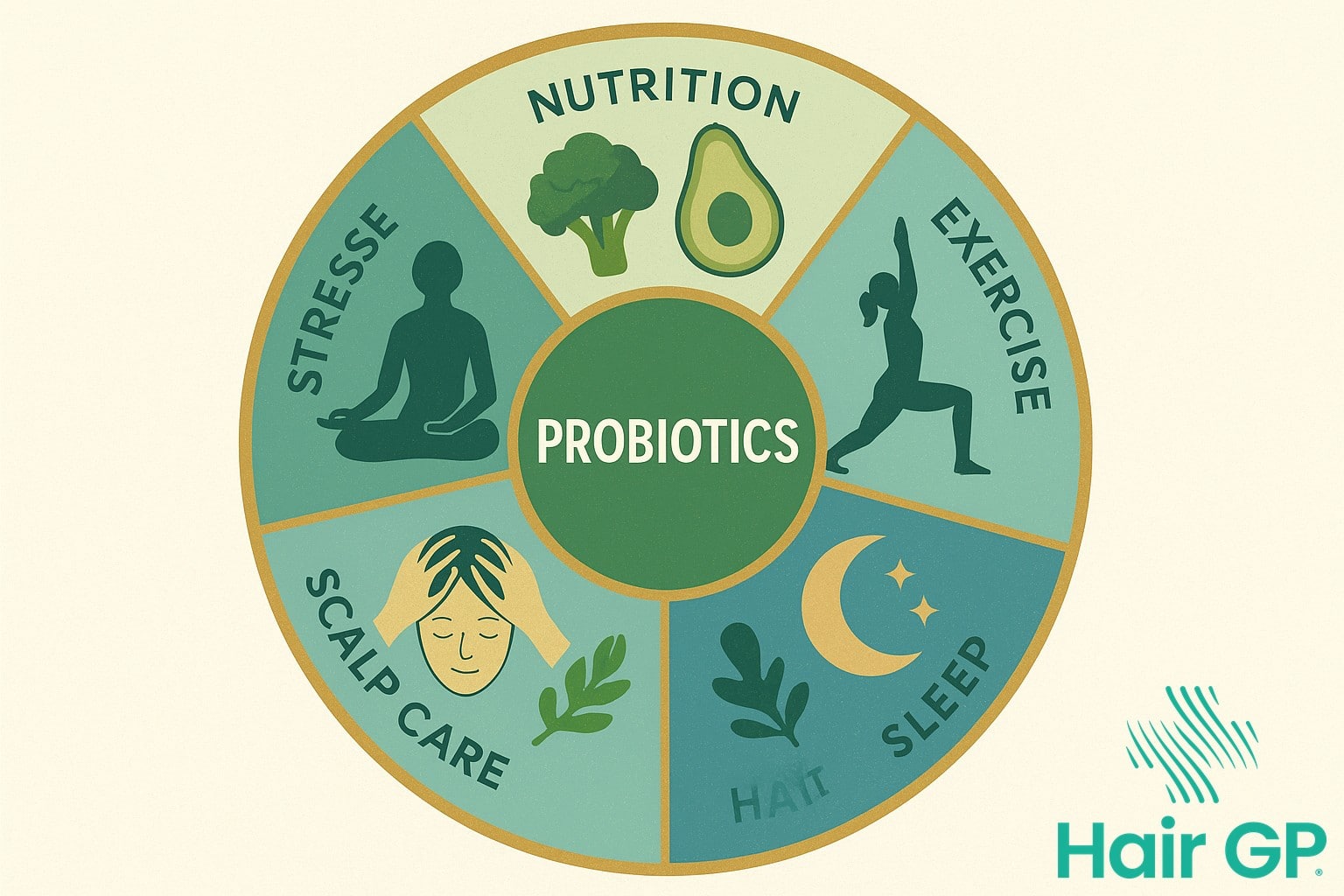
Timeline: When to Expect Results
Understanding realistic timeline expectations for probiotic benefits on hair health helps maintain motivation throughout your wellness journey. Unlike conventional hair treatments, probiotics work systemically by improving gut health first, which then influences hair growth through enhanced nutrient absorption and reduced inflammation.
Initial changes typically occur beneath the surface during the first 4-8 weeks. During this period, probiotics begin colonising the gut and modulating the microbiome, though visible results remain minimal. Some individuals report reduced scalp irritation and improved overall wellbeing, which indirectly supports healthier hair conditions.
Between months two and four, early signs of improvement may emerge. Hair texture often improves first, with strands feeling stronger and less prone to breakage. Existing hair may appear shinier and more manageable as nutrient absorption enhances. However, significant hair regrowth typically requires patience beyond this initial phase.
Visible results for new growth and increased hair thickness generally manifest between months three and six. The hair growth cycle means that follicles activated by improved gut health take time to produce noticeable changes. Most clinical studies evaluating probiotics for hair health span 12-16 weeks minimum to capture meaningful outcomes.
Individual response times vary considerably based on factors including baseline gut health, stress levels, dietary habits, and genetic predisposition. Age, hormonal status, and severity of hair concerns also influence timeline expectations. Maintaining consistency with daily probiotic supplementation proves crucial, as sporadic use significantly delays potential benefits and may prevent meaningful improvements altogether.
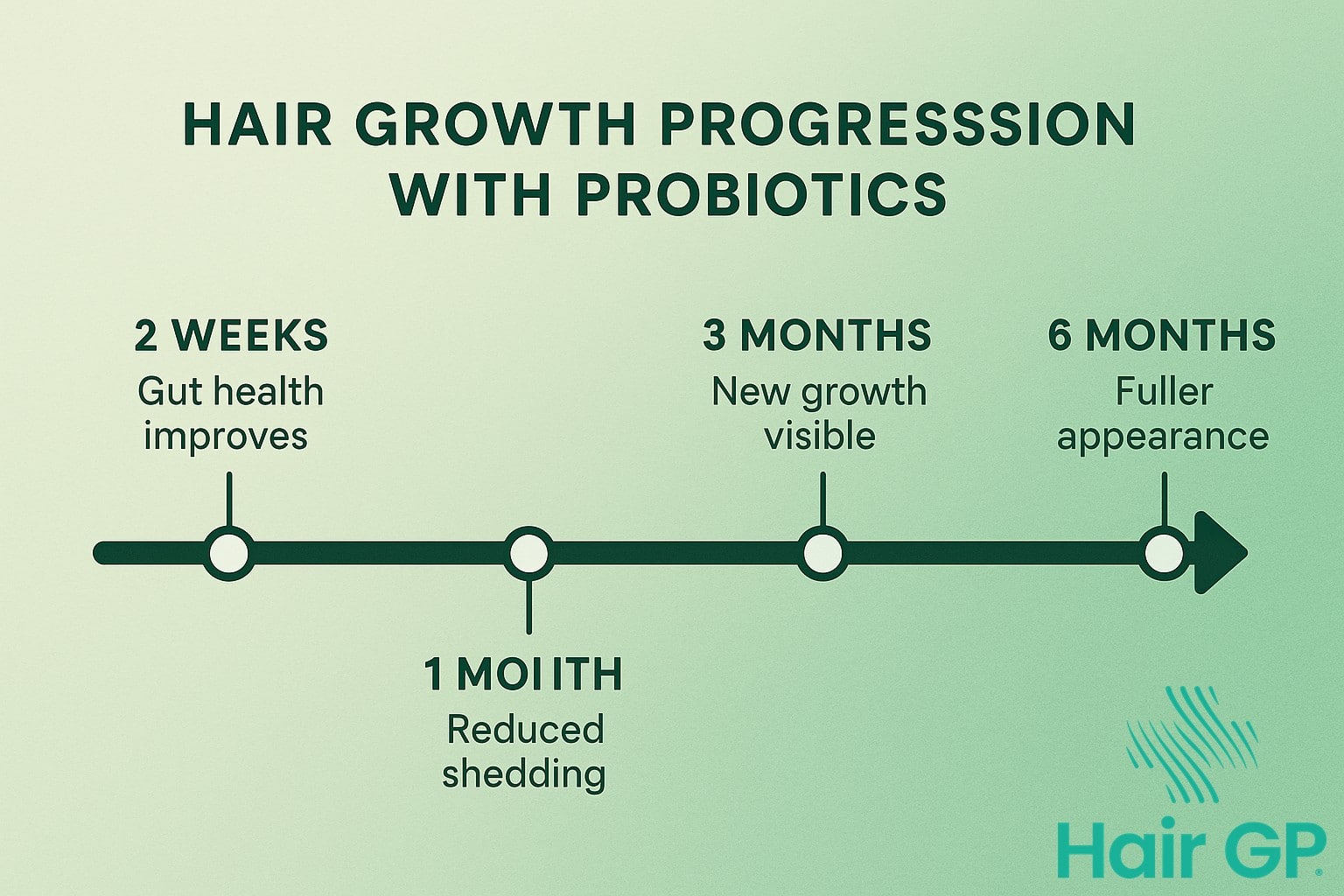
Potential Side Effects and Precautions
Whilst probiotics are generally considered safe for most individuals, understanding potential side effects and safety considerations is essential when taking probiotics for hair health. Most adverse reactions are mild and temporary, typically manifesting as digestive symptoms during the initial adjustment period. Common side effects include bloating, gas, and mild abdominal discomfort, which usually resolve within several days as the gut microbiome adapts to the introduction of new bacterial strains [17].
The interaction between good and bad bacteria in the digestive system can initially cause temporary imbalances, particularly when starting high-dose probiotic supplements. Some individuals may experience increased bowel movements or changes in stool consistency as the probiotic bacteria establish themselves and compete with existing gut flora. These effects typically diminish as the microbiome reaches a new equilibrium, usually within one to two weeks of consistent supplementation.
Important precautions exist for specific populations who should exercise caution or avoid probiotic supplementation entirely. Individuals with compromised immune systems, including those undergoing chemotherapy, organ transplant recipients, or people with HIV/AIDS, face increased risk of probiotic-related infections [18]. Similarly, critically ill patients, those with short bowel syndrome, or individuals with central venous catheters should ALWAYS consult healthcare providers before initiating probiotic therapy.
Drug interactions represent another crucial safety consideration when incorporating probiotics into hair health regimens. Antibiotics can significantly reduce probiotic effectiveness, whilst immunosuppressant medications may interact unpredictably with live bacterial cultures. Pregnant and breastfeeding women should seek medical guidance before starting probiotic supplementation, as research on safety during these periods remains limited. Anyone experiencing persistent adverse effects, unusual symptoms, or concerns about probiotic use should promptly consult their healthcare provider to ensure safe and appropriate supplementation strategies.
Success Stories and Case Studies
Documented case studies and clinical trials have begun revealing compelling evidence of how probiotics can improve hair growth and overall scalp health. These real results demonstrate the potential of microbiome-based interventions for addressing various hair concerns, though individual responses vary based on numerous factors including genetics, diet, and existing health conditions.
A notable clinical investigation examined the effects of oral probiotic supplementation on women experiencing hair thinning. After 16 weeks of daily probiotic intake, participants showed measurable improvements in hair thickness and density, with 82% reporting visible enhancement in hair volume [19]. The success stories from this trial highlighted not only quantitative measurements but also participants’ improved confidence and satisfaction with their hair appearance.
Another documented case series focused on individuals with stress-related hair loss who incorporated specific probiotic strains into their wellness routines. The results demonstrated significant hair regrowth within three to six months, particularly when probiotics were combined with stress management techniques [20]. These cases emphasised the interconnected nature of gut health, stress response, and follicle function.
Clinical observations have also revealed promising outcomes in cases involving scalp inflammation and dandruff. Patients using targeted probiotic formulations experienced reduced scalp irritation and improved hair growth patterns, suggesting that addressing underlying inflammatory processes through gut health optimisation can yield visible results.
While these case studies provide encouraging evidence, researchers consistently note that success varies among individuals. Factors such as the specific probiotic strains used, dosage, duration of supplementation, and concurrent lifestyle modifications all influence outcomes. The most successful cases typically involve a comprehensive approach combining probiotic supplementation with proper nutrition, stress management, and appropriate hair care practices, demonstrating that probiotics work best as part of an integrated strategy for hair health improvement.
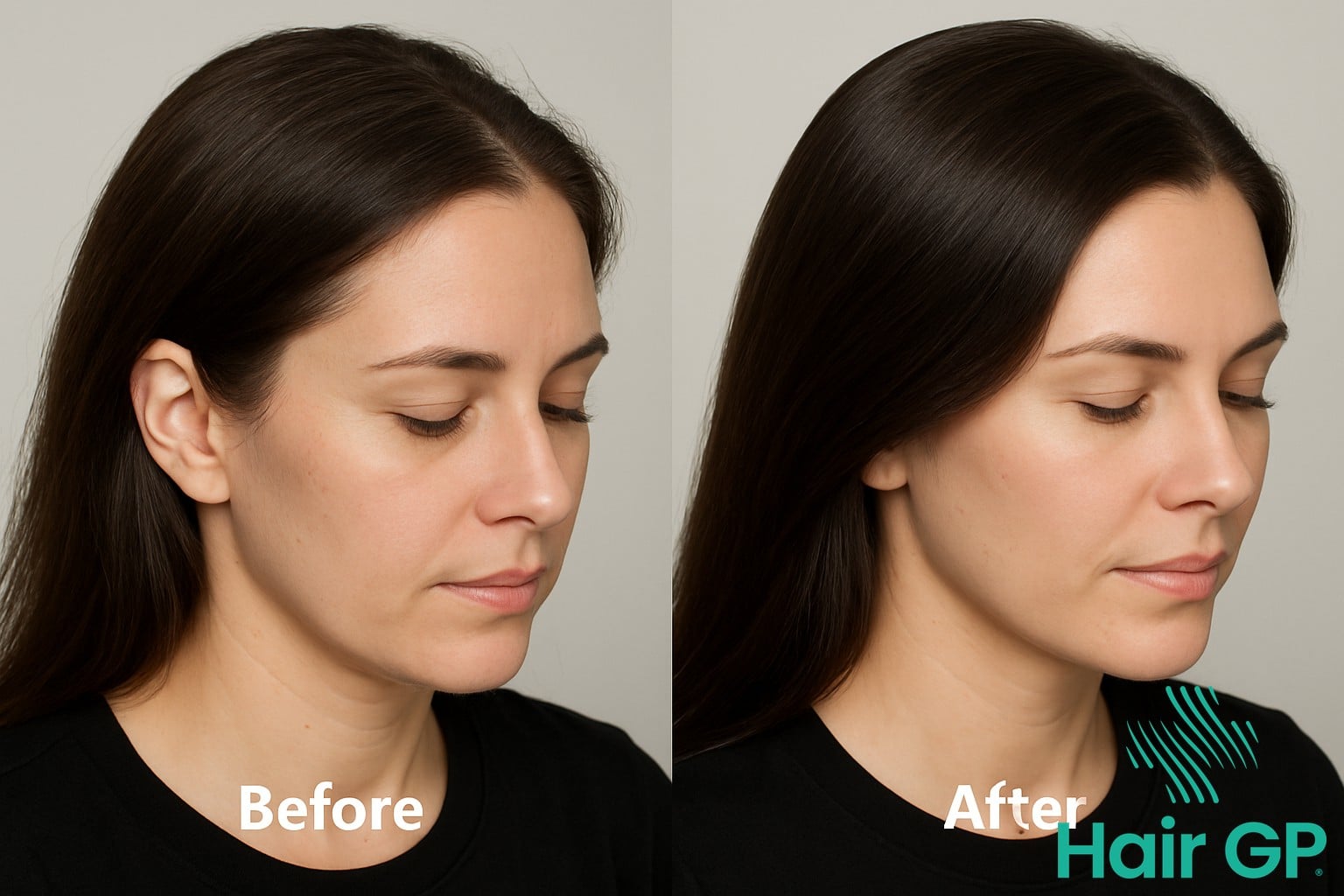
Building a Gut-Healthy Lifestyle
Creating a lifestyle that nurtures both gut health and hair growth extends beyond simply taking supplements. By incorporating simple dietary choices, managing stress effectively, and prioritising quality sleep, you can establish a foundation that supports your body’s natural healing processes and promotes healthy hair from within.
Dietary Modifications
Building a gut healthy diet begins with incorporating prebiotic foods that nourish beneficial bacteria. Garlic, onions, bananas, and asparagus provide essential fibres that feed your microbiome, whilst fermented foods like yoghurt, kefir, and sauerkraut introduce beneficial probiotics naturally. These dietary choices create an environment where your healthy gut can thrive, directly supporting nutrient absorption crucial for hair growth.
An anti-inflammatory diet further enhances this gut-hair connection. Omega-3 rich foods such as salmon, walnuts, and flaxseeds reduce systemic inflammation that can damage hair follicles. Colourful vegetables and berries provide antioxidants that protect both gut lining and hair cells from oxidative stress. Limiting processed foods, excess sugar, and alcohol helps maintain microbial balance whilst preventing inflammation that undermines hair health.
Hydration plays an often-overlooked role in this holistic approach. Drinking adequate water—typically 2-3 litres daily—supports digestive function, nutrient transport, and toxin elimination. Proper hydration ensures nutrients reach hair follicles whilst maintaining the mucosal lining that protects your gut.
Stress and Sleep Management
Lifestyle factors significantly impact the delicate gut-hair relationship. Chronic stress elevates cortisol levels, disrupting both digestive function and hair growth cycles. This hormone imbalance can trigger hair loss whilst simultaneously damaging gut bacteria diversity. Simple stress-reduction techniques like deep breathing exercises, regular walks in nature, or gentle yoga can help regulate cortisol production.
Quality sleep proves equally vital to improve gut health and support healthy hair. During deep sleep, your body repairs tissues, balances hormones, and allows gut bacteria to perform essential functions. Aim for 7-9 hours nightly, maintaining consistent sleep schedules that align with your natural circadian rhythms.
Meditation benefits extend beyond stress relief, positively influencing gut bacteria composition and reducing inflammation markers linked to hair loss. Even 10-15 minutes of daily mindfulness practice can create meaningful improvements in both digestive wellness and hair vitality, demonstrating how simple lifestyle modifications can yield significant results.
Future Research and Developments
The landscape of future research in probiotic hair therapy continues to expand as scientists uncover novel mechanisms linking the microbiome to follicular health. Current investigations focus on identifying emerging strains with enhanced capabilities for stimulating hair regrowth and preventing premature hair loss. Researchers at leading institutions are examining previously unexplored bacterial species that demonstrate promising anti-inflammatory properties and the ability to modulate local immune responses within the scalp environment.
Recent scientific developments have revealed innovative approaches to probiotic delivery, including microencapsulation techniques that protect beneficial bacteria whilst ensuring targeted release at the follicular level. Advanced probiotic technology now enables the creation of synbiotic formulations combining multiple strains with prebiotic compounds, potentially amplifying therapeutic effects. Ongoing trials are investigating topical probiotic serums incorporating nanotechnology for enhanced penetration and sustained release, whilst parallel research explores the development of personalised probiotic protocols based on individual microbiome profiling.
Looking ahead, scientists anticipate breakthroughs in understanding strain-specific mechanisms and their interactions with human genetic factors. The integration of artificial intelligence in microbiome analysis promises to accelerate the identification of optimal probiotic combinations for various hair conditions. As research methodologies advance, the potential for developing targeted interventions that address specific hair concerns whilst maintaining scalp ecosystem balance becomes increasingly achievable.
Conclusion
The emerging connection between probiotics and hair regrowth represents a promising frontier in understanding how gut health influences follicular function. Whilst traditional treatments remain valuable, evidence-based research increasingly supports the role of beneficial bacteria in creating optimal conditions for healthy hair growth. The microbiome’s influence on inflammation, nutrient absorption, and hormonal balance provides multiple pathways through which probiotics may support hair regeneration.
Adopting a holistic approach that combines probiotic supplementation with proper nutrition, stress management, and appropriate topical treatments offers the most comprehensive strategy for addressing hair concerns. Rather than seeking immediate miracles, maintaining realistic expectations allows for the gradual improvements that characterise biological healing processes. The typical three-to-six-month timeline for visible results reflects the natural hair growth cycle and the time required for gut microbiome rebalancing.
For those experiencing hair loss or seeking to optimise hair health, incorporating quality probiotics into a broader wellness routine presents minimal risks with potential significant benefits. As research continues to unveil the intricate connections between gut bacteria and follicular health, probiotics emerge not as a standalone solution but as a valuable component of evidence-based hair care strategies that address root causes rather than merely treating symptoms.
Frequently Asked Questions
Most people begin noticing initial improvements in hair health within 4-8 weeks of consistent probiotic use, such as reduced shedding and improved scalp condition. However, visible new hair growth typically takes 3-6 months, as hair grows slowly at about half an inch per month. Individual results vary based on the underlying cause of hair loss, overall health, and the specific probiotic strains used.
Generally, probiotics are safe to use alongside conventional hair loss treatments like minoxidil or finasteride. In fact, they may complement these treatments by addressing gut health and reducing inflammation. However, always consult your healthcare provider before combining treatments, especially if you have underlying health conditions or are taking other medications.
Research suggests that Lactobacillus strains (particularly L. acidophilus and L. plantarum) and Bifidobacterium species show the most promise for hair health. These strains help reduce inflammation, improve nutrient absorption, and support immune function. Look for supplements containing multiple strains with at least 10-50 billion CFUs for optimal benefits.
While initial improvements require consistent use for several months, long-term maintenance varies by individual. Some people find they can reduce frequency or switch to probiotic-rich foods once hair health improves. Others may need ongoing supplementation. The key is maintaining good gut health through diet, lifestyle, and appropriate probiotic support as needed.
Topical probiotic hair products can support scalp microbiome balance and may help with conditions like dandruff, but oral probiotics appear more effective for systemic hair health benefits. The gut-hair connection primarily works through internal mechanisms like nutrient absorption and inflammation control. For best results, consider combining both approaches.
References
- Salem I, Ramser A, Isham N, Ghannoum MA. The Gut Microbiome as a Major Regulator of the Gut-Skin Axis. Front Microbiol. 2018;9:1459.
- Mahmud MR, Akter S, Tamanna SK, et al. Impact of gut microbiome on skin health: gut-skin axis observed through the lenses of therapeutics and skin diseases. Gut Microbes. 2022;14(1):2096995.
- Plaza-Diaz J, Gomez-Llorente C, Fontana L, Gil A. Modulation of immunity and inflammatory gene expression in the gut, in inflammatory diseases of the gut and in the liver by probiotics. World J Gastroenterol. 2014;20(42):15632-15649.
- Skowron K, Bauza-Kaszewska J, Kraszewska Z, et al. Human Skin Microbiome: Impact of Intrinsic and Extrinsic Factors on Skin Microbiota. Microorganisms. 2021;9(3):543.
- Park DW, Lee HS, Shim MS, et al. Do Kimchi and Cheonggukjang Probiotics as a Functional Food Improve Androgenetic Alopecia? A Clinical Pilot Study. World J Mens Health. 2020;38(1):95-102.
- Rebello D, Wang E, Yen E, et al. Hair Growth in Two Alopecia Patients after Fecal Microbiota Transplant. ACG Case Rep J. 2017;4:e107.
- Rinaldi F, Pinto D, Marzani B, et al. Human microbiome: What’s new in scalp diseases. J Transl Sci. 2018;4(6):1-4.
- Salem I, Ramser A, Isham N, Ghannoum MA. The Gut Microbiome as a Major Regulator of the Gut-Skin Axis. Front Microbiol. 2018;9:1459.
- Park DW, Lee HS, Shim MS, et al. Do Kimchi and Cheonggukjang Probiotics as a Functional Food Improve Androgenetic Alopecia? A Clinical Pilot Study. World J Mens Health. 2020;38(1):95-102.
- Rinaldi F, Pinto D, Marzani B, et al. Human microbiome: What’s new in scalp diseases. J Transl Sci. 2018;4(6):1-4.
- Boyajian JL, Ghebretatios M, Schaly S, et al. Microbiome and Human Aging: Probiotic and Prebiotic Potentials in Longevity, Skin Health and Cellular Senescence. Nutrients. 2021;13(12):4550.
- Harada K, Saito M, Sugita T, Tsuboi R. Malassezia species and their associated skin diseases. J Dermatol. 2015;42(3):250-257.
- Sánchez-Pellicer P, Navarro-Moratalla L, Núñez-Delegido E, et al. Acne, Microbiome, and Probiotics: The Gut-Skin Axis. Microorganisms. 2022;10(7):1303.
- Reygagne P, Bastien P, Couavoux MP, et al. The positive benefit of Lactobacillus paracasei NCC2461 ST11 in healthy volunteers with moderate to severe dandruff. Benef Microbes. 2017;8(5):671-680.
- Kristensen NB, Bryrup T, Allin KH, et al. Alterations in fecal microbiota composition by probiotic supplementation in healthy adults: a systematic review of randomized controlled trials. Genome Med. 2016;8(1):52.
- Tompkins TA, Mainville I, Arcand Y. The impact of meals on a probiotic during transit through a model of the human upper gastrointestinal tract. Benef Microbes. 2011;2(4):295-303.
- Doron S, Snydman DR. Risk and safety of probiotics. Clin Infect Dis. 2015;60(Suppl 2):S129-S134.
- Plaza-Diaz J, Ruiz-Ojeda FJ, Gil-Campos M, Gil A. Mechanisms of Action of Probiotics. Adv Nutr. 2019;10(suppl_1):S49-S66.
- Ablon G, Kogan S. A Six-Month, Randomized, Double-Blind, Placebo-Controlled Study Evaluating the Safety and Efficacy of a Nutraceutical Supplement for Promoting Hair Growth in Women With Self-Perceived Thinning Hair. J Drugs Dermatol. 2018;17(5):558-565.
- Rinaldi F, Trink A, Pinto D. Efficacy of Postbiotics in a PRP-Like Cosmetic Product for the Treatment of Alopecia Area Celsi: A Randomized Double-Blinded Parallel-Group Study. Dermatol Ther (Heidelb). 2020;10(3):483-493.



